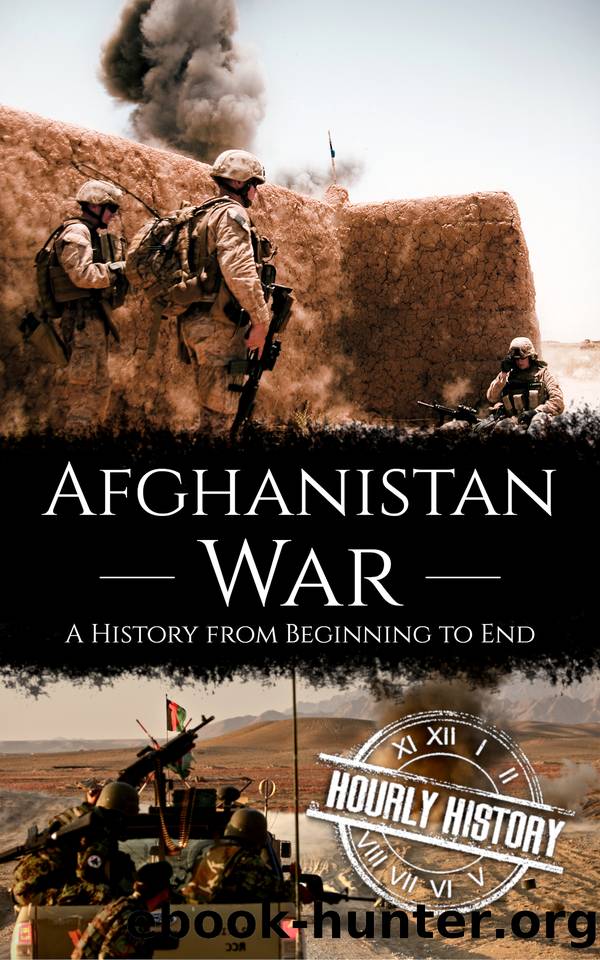Afghanistan War: A History from Beginning to End (Middle Eastern History) by History Hourly

Author:History, Hourly
Language: eng
Format: epub
Publisher: Hourly History
Published: 2023-09-10T00:00:00+00:00
Chapter Seven
Peace Talks: Outrage and Anger
âDespite all odds, despite all difficulties, despite all challenges, Afghanistan stands; Afghanistan fights on.â
âAshraf Ghani
In January 2013, the Taliban did something that seemed to suggest that they might be willing to enter negotiationsâthey opened an office in Qatar. This was a very significant move. Previously, the Taliban had operated as a guerilla organization, with no accepted overall commander and local groups operating virtually independently. This made it almost impossible to have discussions with the organization as a whole, and agreements with local units offered little in terms of overall progress.
Soon, Taliban leaders in Qatar entered initial discussions with officials from the United States, but these broke up in acrimony after less than two months. Part of the issue was the refusal of the Americans to discuss the possibility of prisoner exchanges without the assurance of some concrete progress in talks. However, there were other problems involved.
In 2012, US troops stationed at Bagram Air Base in Parwan province in Afghanistan were accused of burning copies of the Quran. This appeared to be true; copies of the Quran had been given to prisoners, but the commander of the air base claimed that some had added âextremist inscriptionsâ to their books, and the affected pages were ordered to be destroyed by burning. This was certainly insensitive; the deliberate destruction of a copy of the Quran is regarded by many Muslims as an act of extreme sacrilege. In five days of rioting at Bagram, 30 people were killed and more than 200 injured. Rioting also spread to other parts of Afghanistan, including, most worryingly for the US, not just Taliban-controlled areas but also to Kabul.
The situation was further inflamed when a video was posted online which showed US Marines urinating on the bodies of dead Taliban fighters. Shortly afterward, news spread that a US soldier had gone on a killing spree in Kandahar province, murdering sixteen civilians (including nine children) before setting their bodies on fire. Talks between the Taliban and the United States foundered in a growing sense of hysteria and outrage. President Karzai called for all US troops to be withdrawn from village outposts and instead to be housed only in recognized military bases.
It was not until June 2013 that the US resumed talks with the Taliban through their office in Qatar. This angered President Karzai, who maintained that the Taliban was a terrorist organization and that conducting talks simply gave it legitimacy. He then broke off all talks with the United States. That was short-lived, and with their UN mandate expiring in December 2013, the US government was forced to negotiate a bilateral agreement with President Karzai to allow their troops to remain in Afghanistan after that time.
This agreement would leave just 10,000 US troops in Afghanistan after the end of 2014, who would primarily be involved in training the Afghan army and police forces. There would be no more âsurgesâ by US troops in Afghanistan. Nevertheless, though it may have had far fewer troops on
Download
This site does not store any files on its server. We only index and link to content provided by other sites. Please contact the content providers to delete copyright contents if any and email us, we'll remove relevant links or contents immediately.
| Civil War | Operation Desert Storm |
| Veterans | Vietnam War |
The Radium Girls by Kate Moore(10914)
The Templars by Dan Jones(4192)
100 Deadly Skills by Clint Emerson(4084)
Rise and Kill First by Ronen Bergman(4016)
The Doomsday Machine by Daniel Ellsberg(3736)
The Rape of Nanking by Iris Chang(3522)
Killing England by Bill O'Reilly(3459)
Hitler in Los Angeles by Steven J. Ross(3443)
Stalin by Stephen Kotkin(3089)
12 Strong by Doug Stanton(3059)
Hitler's Monsters by Eric Kurlander(2736)
Darkest Hour by Anthony McCarten(2650)
Blood and Sand by Alex Von Tunzelmann(2611)
The Art of War Visualized by Jessica Hagy(2416)
Hitler's Flying Saucers: A Guide to German Flying Discs of the Second World War by Stevens Henry(2298)
The Code Book by Simon Singh(2215)
The Second World Wars by Victor Davis Hanson(2136)
Babylon's Ark by Lawrence Anthony(2073)
Tobruk by Peter Fitzsimons(2064)
